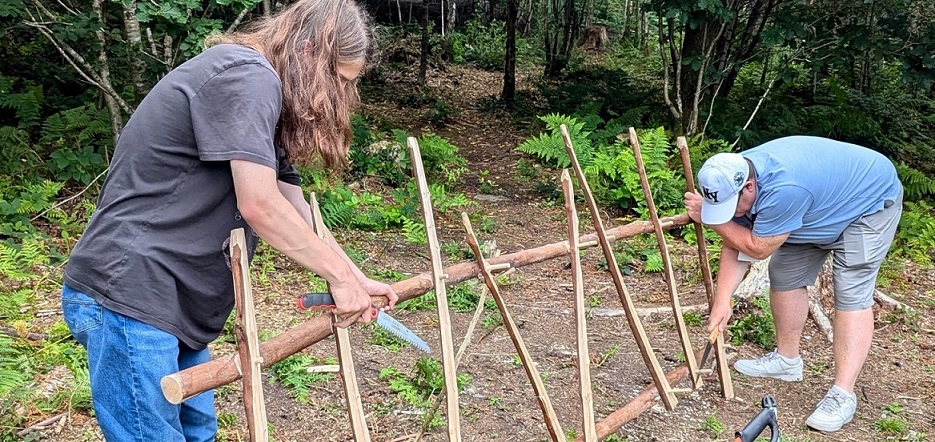
Greenwood wellbeing activities at Craig Gwladus Country Park © Richard Manning.
Wales’s rich heritage is not just a relic of the past, but a valuable asset that can improve lives in today’s Wales, boosting health, resilience and wellbeing, new evidence from a pioneering Neath Valley project has shown.
The project was the restoration of a Victorian colliery smithy as part of the community-run Craig Gwladus Country Park in Neath Port Talbot. One of its benefits was teaching building skills to young people from a local further education college.
Led by Swansea University historian Dr Alex Langlands, the project is one of five across the UK, known as Community Innovation Practitioner (CIP) awards, funded by the Arts and Humanities Research Council.
Over the last 12 months the five CIPs have worked with government, private, public and third sector partners to deliver new cultural research and development aimed at enhancing local belonging and pride in place.
Now the results of all five projects have been released, as a series of podcasts, case studies and policy papers.
The results provide vital new evidence on the power of partnerships and working with communities in the field of heritage, showing its potential to shape and sustain resilient communities. They show that heritage can be a valuable asset – all the more important in areas like south Wales where there are high levels of social and economic deprivation, but an extremely rich heritage.
The Neath Valley project illustrates clearly the value of community heritage, and the benefits that it can bring.
Managed by heritage and attractions expert Lisa Kirman, project benefits include:
- 2000 hours of volunteer work provided
- 15 students from the local further education college gained between them 77 days of experience learning new skills in building and conservation
- A heritage monument vital to the place-making ambitions of the park has been rediscovered and stabilised for future generations
- The next generation of conservation builders have had an introduction to the kinds of skills required to keep Neath Port Talbot's important historic buildings off the 'at risk register'.
Dr Alex Langlands of Swansea University, who led the Neath Valley project, said:
“Wales has amazing heritage assets and communities keen to engage and celebrate. As government cuts to arts and culture impact service delivery, is it time to think about placing heritage more centrally within the Wellbeing of Future Generations Act as the means by which we deliver a healthier, more resilient and culturally vibrant Wales?”
Dr Langlands explained the evidence that the project had provided:
“It has identified the range of expertise and knowledge required to mobilise and deliver community-led heritage participation.
"As a result of the research, a community of practice has come together to model ways in which co-creation can deliver real benefits.”
Christopher Smith, Executive Chair of AHRC, said:
“AHRC Creative Communities seeks to bring rigorous research and a principle of co-creation to building stronger local partnerships. The Community Innovation Practitioner award brings research and practical understanding together to make us all partners in developing the potential we have, to be better, creative and more fulfilled citizens. This scheme exemplifies AHRC’s commitment within UKRI to evidence-driven citizen science, underpinned by our strategy to Transform Tomorrow Together.”
Community Innovation Practitioner (CIP) Awards 2023-24 provided £290,000 to five CIPs across all the four nations of the UK to work with cross sector stakeholders and communities with the aim of generating new culture to enhance community cohesion.
It forms part of AHRC Creative Communities, a £3.9m major research programme based at Northumbria University. It explores how co-created culture can enhance belonging, address regional inequality, deliver devolution, and break down barriers to opportunity for communities in devolved settings across all 4 nations of the UK.
